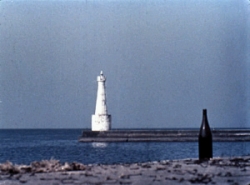Is It Really a Great Movie? Part Seventeen: Floating Weeds
by dan heaton
Using Roger Ebert's Great Movies book as a guide, this series of articles will focus on all films included on his list that previously have escaped my notice. Since all lists are subjective, I am not treating Ebert's choices as the essential selection of films. However, his essays offer the perfect chance for me to explore both classics and lesser-known pictures from around the globe.

After catching some highly talented directors during this series, Iíve finally reached one of the greatest Ė Yasujiro Ozu. Numerous critics describe the Japanese filmmaker as one of cinemaís premier artists, yet his work does not receive nearly the same mass recognition as Akira Kurosawa. This disparity could be due to Ozuís deliberate style, which takes its time and completely avoids moving the camera. The images are stunning and colorful, but they lack the active pace associated with some classic directors. Released in 1959, Floating Weeds is not as well-known as Tokyo Story, but it did receive inclusion on Ebertís 1991 list of the 10 best films of all time. Presented in an excellent Criterion DVD (with an Ebert commentary), this engaging film deserves greater recognition from discerning filmgoers.
This film is actually a remake of Ozuís 1934 movie The Story of Floating Weeds ó also included with the Criterion release. That picture is 30 minutes shorter than the remake and shot in black and white, but the basic story closely resembles the 1959 film. The melodrama is heightened, and the characters are sadder (particularly the young manís mother), which creates a darker tone. The photography is still impressive, but the lack of bright colors lessens its visual impact when compared to the newer version. The setting is also varied, but the plotís key elements differ only slightly between the pictures, which both offer a moving, interesting tale. I prefer the 1959 version and feel that Ozuís improved style makes it a more attractive picture, but both films are very strong.
Floating Weeds tells the story of a traveling acting troupe who arrive at a seaside village to give a series of performances. Their old-style shows are losing touch in the modern world, so drawing crowds may be difficult. The actors also are growing older, and arenít conveying the same passion they may have possessed years earlier. Most of the guys spend their free time cavorting with the townís young women, which appears to take precedence over giving a top-notch performance. One exception is master Komajuro (Ganjiro Nakamura), who has a different focus ó spending time with his rarely seen son Kiyoshi (Hiroshi Kawaguchi). The genial young man believes that Komajuro is his uncle, which makes things easier for the constant traveler. His mother Oyoshi (Haruko Sugimura) was an old flame and hopes that he will stay, but Komajuro remains focused on connecting with his son.
This picture offers an interesting story and good acting, but the true star is Ozu. Many shots resemble attractive paintings and benefit from the completely static camera. Characters are placed within the frame to maximize the visuals and often minimize their prominence. Ozu generally avoids close-ups and makes the camera a passive observer of the filmed activity. The melodrama increases greatly here when Komajuroís mistress Sumiko (Machiko KyŰ) discovers the existence of his son and former lover. Her jealousy causes her to enact a devious plan to ensnare the boy and punish his father. The result is surprising and touching, but Ozu never manipulates the audience to generate these emotions. Instead, he inspires our feelings through majestic colors and original compositions that enhance the story. The actors rarely go over the top and are instructed not to act, which lowers their energy but increases the realism.
Roger Ebert states that ďsooner or later, everyone who loves movies comes to Ozu.Ē Itís taken me a while to make it here, but Iíve finally made it to Ozu. His pictures move slowly, but they provide an immersive experience that is nearly impossible to duplicate. Floating Weeds does offer an engaging story, but it would only be mildly interesting without his remarkable direction. Assisted greatly by the photography of his longtime associate Kazuo Miyagawa, Ozu crafts a unique picture that still charms nearly 50 years after its original release. I believe it is a Great Movie and deserves greater notice from todayís younger generations. The excellent Criterion release will hopefully draw other movie lovers to make their way to the classic Japanese filmmaker.
Copyright (c) 2007 erasing clouds |
|